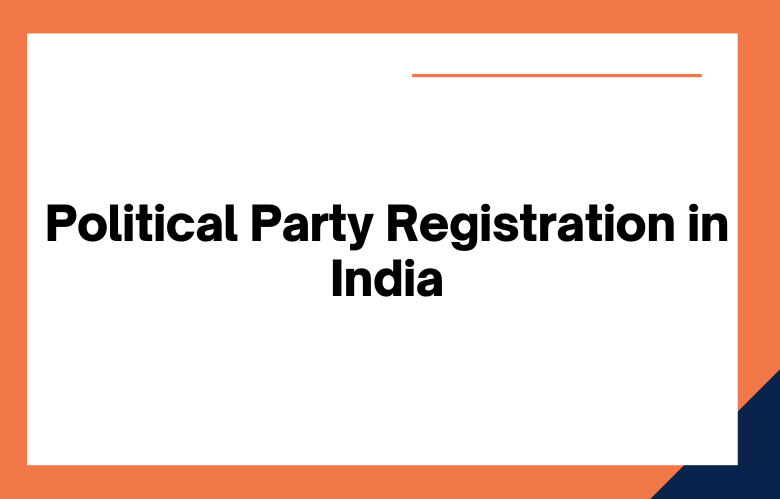Political party registration in India is a process that all Indian citizens must go through to participate in the political process. The guidelines and process for political party registration define here so that you can understand what you require and how to complete the registration process.
The process of registering a political party in India is detailed and thorough. In this blog post, we will get you through the entire process of Political Party Registration in India, even if you are an Indian Citizen looking to register your political party or want to learn more about the process.
Political Party Registration in India
India has two major political parties: One is the Indian National Congress, and the other is Bharatiya Janata Party.
The Indian National Congress is the older two parties, founded in 1885. The Bharatiya Janata Party began in 1980.
Both parties have their ideology and base of support. The Congress party is more left-leaning, while the BJP is more right-leaning.
The Congress party has powered most of India’s history since its independence in 1947. The BJP has been in force for years, but its support base has increased recently.
Political party registration in India is a process that must complete becoming a recognized political party officially. The process is lengthy and complex and requires much paperwork and documentation. Once registered, a political party can contest elections and participate in the political process.
Interested organizations must complete a lengthy and complex registration process to become a recognized political party in India. The process requires extensive paperwork and documentation but, once completed, allows the party to participate in elections and other political activities.
Each political party in India is required to register with the Election Commission. This process includes submitting a list of party leaders and obtaining approval from the Commission.
Obtaining approval from the Election Commission is essential for any political party that wishes to operate in India. The process of registration includes submitting a detailed list of party leaders. It ensures that the Commission knows who is running the party and can hold them accountable for their actions.
In India, there is a formal process for registering political parties.
Registering a party must apply to the Election Commission of India.
The Commission then examines the application and decides whether or not to grant registration.
In India, political party registration is a process that must complete before participating in elections. The Election Commission of India oversees the process, and it requires submitting various documents and forms. Political parties must also meet specific criteria to be registered. After a party is registered, it is assigned a symbol that represents it on the ballot.
Political Party Registration Process in India
The procedure of registering as a political party in India can be daunting. There are many requirements, and it can be challenging to get everything in order. However, the process is worth it for those who want to make a difference in their country. By registering as a political party, you can help shape the future of India.
One of the essential requirements for voting in India is party registration. Political parties in India must register with the Election Commission of India (ECI).
The ECI is a permanent constitutional body responsible for administering elections in the country.
To register, a political party must apply for the ECI.
The application must include the party’s name, symbol, and address.
After the application is received, the ECI will review it and decide whether or not to approve the party’s registration.
A person should be 18 to register as a political party member in India. You must follow several steps to complete the registration process.
First, the applicant must fill out a form with basic personal information.
Next, you must submit the form to the local Election Commission office. After the state has been reviewed and approved, the applicant will register as a political party member.
- In India, political party registration is a very lengthy process
- The first step is to get your party name approved by the Election Commission
- Once you have a party name, you need to collect 100 signatures from registered voters in your state
- You then need to apply with all of the required documentation
- After your application goes for review, the Election Commission will hold a hearing where you and any other interested parties can make your case.
- If everything goes well, register your party, and you can start campaigning.
- Political parties must have a name, symbol, and Constitution
- The party’s Constitution must state the objectives of the party
- The party must also have an office in at least one Indian state
- To register a political party, the party must submit an application to the ECI with the required documents
- There is a registration fee for political parties
- Once registered, a political party can field candidates in elections, and contesting elections is compulsory for all registered parties
- some documents need to submit as part of the application
- The Registrar then evaluates the application and makes a decision
- If the application is approved, the party becomes registered and can start operating legally
- If the application gets denied, the party can appeal to higher authorities
- There are several benefits associated with political party registration in India
- They also have access to other resources like polling booths and media coverage
- The applicant must and should be at least 18 years old and have the support of at least ten people
- The application must be in the form of a notarized affidavit
- The applicant must submit copies of all relevant documents, including the Constitution of India and party by-laws
- Once registered, the party allocates a symbol that appears on all election ballots
- To remain registered, the party must contest elections in every state assembly and parliament within six years
- If they fail to do so, their registration will be automatically canceled.
- There are several different parties to choose from, each with unique values.
- If someone changes their mind about which party they want to belong to, they can switch parties anytime before the election deadline.
- Parties often hold rallies and meetings where citizens can learn more about their platform and what they stand for
- Once registered, citizens can vote in all national and state elections.
- The application for registration must be made in writing and signed by the president or secretary of the party.
- The application must include the name of the party, its objectives, and the names and addresses of the members.
- The applicant must also submit a copy of the party’s Constitution or rules and regulations.
- Upon receipt of an application, the Election Commission will publish it in newspapers and on its website.
- If there are any objections to the registration of a party, they must be filed within 30 days, considering the date of publication of the application.
- After considering all objections, the Election Commission will issue a certificate in favor of registration to the party if no objection exists.
Political Party Registration Guidelines in India
- Indian citizens must be 18 years old to register for a political party.
- The application for registration must and should prepare in the prescribed form.
- The applicant must provide the proposed party’s name, objectives, and head office address.
- The applicant must also provide a list of the office-bearers and party executive committee members.
- A copy of the Constitution, Memorandum, and Articles of Association of the party must be attached to the application.
- Upon approval, a certificate of registration will be issued to the party
- To register, you must provide your name, date of birth, contact information, and occupation.
- You must also declare which party to affiliate with and pay a registration fee.
- Once registered, you can vote in your chosen party’s future elections.
- You may also choose to run for office within your chosen party at any time.
- The voter’s name is included in that constituency’s electoral roll to vote in an election.
- The application should include the name ad symbol of the party, as well as the address of its head office.
- Once registered, a political party allows a reserved symbol that will appear on all ballots during elections.
- Parties are also allowed to field candidates for elections if they agree to adopt the rules and regulations set by the Election Commission.
Conclusion
To begin any political party in India, it is essential to understand the guidelines and process involved. We can help you with every process step, from registering your party name to submitting your final application.
We have many years of experience assisting businesses and individuals in registering their political parties, so please Reach us today to get started on your application for further information.











